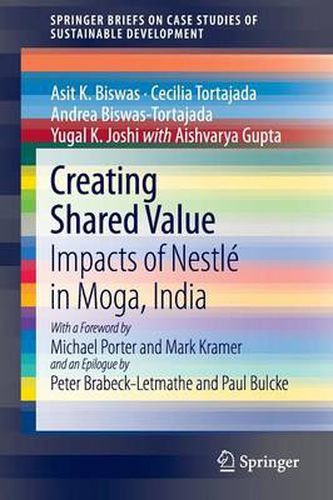Readings Newsletter
Become a Readings Member to make your shopping experience even easier.
Sign in or sign up for free!
You’re not far away from qualifying for FREE standard shipping within Australia
You’ve qualified for FREE standard shipping within Australia
The cart is loading…






This title is printed to order. This book may have been self-published. If so, we cannot guarantee the quality of the content. In the main most books will have gone through the editing process however some may not. We therefore suggest that you be aware of this before ordering this book. If in doubt check either the author or publisher’s details as we are unable to accept any returns unless they are faulty. Please contact us if you have any questions.
Nestle’s Moga factory was set up in 1961 and comprises of the primary milk collection area for Nestle’s operations. Since its inception in Moga, Nestle has been working with its milk farmers and ancillary suppliers towards improving quality and productivity. The study presented in this book (carried out by the Third World Centre for Water Management, Mexico) highlights Nestle’s way of doing business through its philosophy of Creating Shared Value (CSV) and how it contributed to the development of the region over the past 50 years through direct and indirect employment, steady income for milk and other suppliers, and technology transfer. The main objective of the study is to learn to what extent has Nestle contributed to fulfilling the societal aspirations and expectations of the people working in and around its factory in terms of employment generation, poverty alleviation, general improvements in the community’s standards of living and environmental conservation. The study also tried to determine to what extent has the company created shared value for itself, milk farmers, ancillary firms, and the community at large. This effort aims at encouraging more research to be carried out to comprehensively and authoritatively look into the impacts private sector can have on and around the area where their factories are located and that way, contribute to our understanding of social-corporate-government interdependency. An important aspect of this pioneering monograph is the methodology that could be used to study how Corporate Social Responsibility (CSR) or Creating Shared Value (CSV) of a large multinational company can be properly monitored and objectively evaluated at a region-specific scale, especially as very few studies of this nature have been carried out anywhere in the world. This definitive book is further enriched by a foreword by Prof. Michael Porter of Harvard Business School and an epilogue by Peter Brabeck-Letmathe and Paul Bulcke, Chairman of the Board and CEO of Nestle respectively.
$9.00 standard shipping within Australia
FREE standard shipping within Australia for orders over $100.00
Express & International shipping calculated at checkout
This title is printed to order. This book may have been self-published. If so, we cannot guarantee the quality of the content. In the main most books will have gone through the editing process however some may not. We therefore suggest that you be aware of this before ordering this book. If in doubt check either the author or publisher’s details as we are unable to accept any returns unless they are faulty. Please contact us if you have any questions.
Nestle’s Moga factory was set up in 1961 and comprises of the primary milk collection area for Nestle’s operations. Since its inception in Moga, Nestle has been working with its milk farmers and ancillary suppliers towards improving quality and productivity. The study presented in this book (carried out by the Third World Centre for Water Management, Mexico) highlights Nestle’s way of doing business through its philosophy of Creating Shared Value (CSV) and how it contributed to the development of the region over the past 50 years through direct and indirect employment, steady income for milk and other suppliers, and technology transfer. The main objective of the study is to learn to what extent has Nestle contributed to fulfilling the societal aspirations and expectations of the people working in and around its factory in terms of employment generation, poverty alleviation, general improvements in the community’s standards of living and environmental conservation. The study also tried to determine to what extent has the company created shared value for itself, milk farmers, ancillary firms, and the community at large. This effort aims at encouraging more research to be carried out to comprehensively and authoritatively look into the impacts private sector can have on and around the area where their factories are located and that way, contribute to our understanding of social-corporate-government interdependency. An important aspect of this pioneering monograph is the methodology that could be used to study how Corporate Social Responsibility (CSR) or Creating Shared Value (CSV) of a large multinational company can be properly monitored and objectively evaluated at a region-specific scale, especially as very few studies of this nature have been carried out anywhere in the world. This definitive book is further enriched by a foreword by Prof. Michael Porter of Harvard Business School and an epilogue by Peter Brabeck-Letmathe and Paul Bulcke, Chairman of the Board and CEO of Nestle respectively.